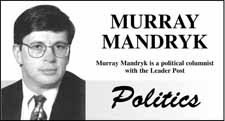Just when you thought the battle over the Canadian Wheat Board was finally over, along comes Regina lawyer Tony Merchant.
The latest in this saga has seen the Merchant law group launch a $15.4-billion class action suit on behalf of Western Canadian farmers. According to the statement filed in Court of Queen's Bench in Saskatoon by the law firm, this is the cost to farmers of the federal government legislation to end the CWB's monopoly.
You will know Tony Merchant for his many class action law suits on behalf of everyone from residential school survivors to those exposed to Agent Orange in New Brunswick more than 50 years ago to cell phone users hammered by extra fees.
But those in rural Saskatchewan with slightly longer memories may recall Merchant for other reasons.
His incredibly successful and sometimes controversial law career included high-profile divorce cases. Perhaps his best-known client was convicted murder Colin Thatcher.
Others will be acquainted with Merchant for his political career that included a term as Liberal MLAs in the 1970s and his connections to former Wheat Board Minister Otto Lang and former Prime Minister Jean Chretien. It was Chretien who appointed Merchant's wife Panna to the Senate.
As a Liberal politician and urban Regina lawyer, one might not necessarily see Tony Merchant as a unifying force. And dredging up the Wheat Board controversy after passage of the federal Conservative government's legislation to do away with its monopoly on wheat and barley sales would certainly seem an unlikely way of bringing rural Saskatchewan interests together.
But in a very strange way, Merchant's lawsuit may be providing an opportunity for both Wheat Board opponents and proponents to come together on at least one thing.
As explained by the Regina lawyer in launching his suit, the legal action stands to potentially be as beneficial to Wheat Board foes as Wheat Board friends. That's because all farmer will be affected. (And in a strange twist, larger producers of wheat and barley - many of whom have traditionally opposed the Wheat Board - may have the argument for the biggest share of the claim.)
The premise of Merchant's argument is that while the federal majority government was entitled to do as in pleases in ending the CWB's monopoly, it must now compensate farmers for what it did - especially given the votes by producers in favour of maintaining the Wheat Board as a single-desk seller.
This was what happened when the Liberal government ended the Crow's Nest Pass Freight rate in 1996 - a decision that result in $1.6-billion payout to Western producers. And the one sentiment that both friends and enemies of the Wheat Board can likely agree on is that the CWB's money should not go back to the federal treasury. It was, after all, farmers' money - money that would have otherwise gone into farmers' pocket for their grain sold - that allowed the CWB to purchase these assets.
Interestingly, those assets fall well short of the $15.4 billion that Merchant's suit claims is owed to farmers. The CWB's tangible assets include $100 million in cash, $102 million for 3,400 hopper cars, $65 million in two lake freighters and the $14 million for the CWB head office in Winnipeg.
However, the Regina lawyer notes that value of CWB isn't in its hard assets, but in other intangibles like premiums paid to wheat and barley farmers ($7.4 billion in the past 20 years) or transportation costs ($7.7 billion). These are worth far more than the CWB's physical assets.
Admittedly, there is no guarantee Merchant will win the case. A huge stumbling block will be the fact that the federal legislation does not liquidate the Wheat Board. There are no assets to be dispersed. It will be interesting to see how suit argues the CWB's loss value.
But that should be of interest to supporters and non-CWB-supporters alike.
Murray Mandryk has been covering provincial politics for over 15 years.




